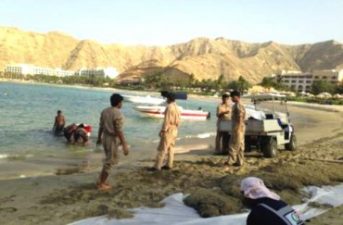 Climate change is here and it looks like there is no way back.
Climate change is here and it looks like there is no way back.
Scientists and policymakers are increasing concerned about extreme weather and climate events. These include extended waves of abnormally hot or cold weather, unseasonal temperatures, changes in precipitation and wind patterns, along with more dramatic occurrences like unprecedented blizzards, cyclones sudden downpours, sudden floods and extended droughts.
Attempts to curtail climate-altering phenomena, which is known as mitigation, has been the focus of international protocols (Montreal, Kyoto) and gatherings (such as the failed Copenhagen Summit of late 2009). While the international community can claim modest achievements in some areas, for example, pacts that have led to a decrease in the use of ozone-reducing substances, reducing the emission of greenhouse gases has been far from encouraging. Accordingly, there is a second focus in the climate change literature, dealing with adaptation.
It is sobering then, that the focus of a special report entitled Managing the Risks of Extreme Events and Disasters to Advance Climate Change Adaptation released last week, by The Inter-Governmental Panel on Climate Change (IPCC) is not on how climate change can be forestalled. Rather, it deals with what societies will have to do to adapt to such change.
Established in 1988 by the United Nations Environmental Program and the World Meteorological Organization, the IPCC’s mandate is to assess “the scientific, technical and socio-economic information relevant to understanding the scientific basis of risk of human-induced climate change, its potential impacts and options for adaptation and mitigation.”
At a time when significant progress is lacking in negotiations to reduce fossil fuel use and other causes of climate change, a shift in emphasis to adaptive strategies is a necessary one.
Implicit to adaptive strategies is the recognition that climate change has already begun, that its impact will be increasingly felt, and that even if mitigation practices are enacted and succeed, planetary systems have been altered.
As stated in the report, [a]nthropogenic climate change is projected to continue during this century and beyond. This conclusion is robust under a wide range of scenarios for future greenhouse gas emissions, including some that anticipate a reduction in emissions (p. 29).
Societies, to survive, will have to adopt economic, social, institutional, technological and cultural practices that are adaptive to these realities. There is recognition that to varying extents, these adaptations will be socially and economically transformative.
A Blueprint for Survival?
The IPCC report deals planning the kinds of supports that will be needed to cope with slowly evolving trends, as well as risk and disaster management for climate events. For example, dramatic sea level rise due to polar or glacial melting is unlikely to take place overnight; flash flooding due to torrential, out-of-season rains already has.
In planning for sea-level rise, delta regions and other low-lying areas should be protected with shore fortifications and drainage systems constructed over the medium-term. Concerning flooding, areas where adequate water runoff systems do not exist, for example shantytowns or spontaneous settlements, the provision of adequate sewage systems a short-run priority.
Determining whether short-, medium- or long-term preparations are needed is a function of the level of vulnerability (defined in economic, social and institutional terms) characteristic of the people, places and property existing in an at-risk area. Exposure describes the extent of damage that could be foreseen in an area due to “people; livelihoods; environmental services and resources; infrastructure; or economic, social, or cultural assets in places that could be adversely affected.”
The aim of adaptive strategies to climate change is to create infrastructures, technologies, economic instrumentalities, institutions and educational programs in place that will increase the resilience of peoples and their life-places. Current thinking largely equates resilience as being the product of sustainable development.
Internationally and in the Middle East
Aside from the country-specific apparatuses and programs that need to be established to deal with climate change phenomena, international cooperation will be essential. In an article I posted yesterday at The Times of Israel, “Israel and Its Neighbors Must Adapt to Climate Change – Together,” I discuss the necessity of international cooperation in contending with climate changes, especially with respect to the Middle East where resource scarcity and fragile ecosystems that straddle national borders are pervasive.
Whether in the form of economic assistance, joint infrastructure development, collaborative planning of shared ecosystems, or information sharing and technology transfer, state borders will be highly porous with respect to climate change. This is especially true since many countries, and sectors in virtually all societies, do not have the resources to contend with the kind of changes and the extent of change that is anticipated – particularly not intensive ones that take place without warning or preparation.
In an increasingly climactically unstable world, the rule of thumb will have to be the interdependence, rather than believing that any particular country can weather the trends alone.
A Report to Take Note of
Although the prestige of the IPCC was dealt a blow in January 2010 when it acknowledged that a mistake had been made in a paragraph of a 2007 report it had issued (an exceptional occurrence which was exploited by climate change deniers as a major component in their disinformation campaign (see my post, Climate Change Denial and the Climate of Fear), the IPCC is still regarded as the leading scientific body monitoring and modeling climate change. Its recommendations are taken as authoritative and are highly influential among environmental professionals.
Policy makers, environmentalists, socially-responsible corporations, institutions and ordinary citizens would do well to study the IPCC Special Report. It could serve as a blueprint for survival in times of the bad weather forecasted ahead.
Dr. Yosef Gotlieb, a contributor to Green Prophet, is a geographer and author, most recently, of Rise, A Novel of Contemporary Israel. His blog, Issues of the Day, appears at www.ysgotlieb.net.
Image of climate change from Shutterstock



Peacefully reduce the human population with family planning education and safely recycle 100% of all human-generated waste materials. If not, everyone will suffer ecocide and extinction as our planet dies from the growing mass of our pollution.
I understand the concerns described above and while it would be far better to make serious inroads in mitigation, given the absence of progress, preparations to adapt to climate change is the only alternative.
Planning has long been viewed (and implemented) as a top-down process where central authorities far removed from the field impose solutions from above. There are alternative systems of planning that involve dialogue, negotiation and reconciliation between peripheries and centers. Of course, to make things work all stakeholders have to be involved with no single sector being privileged in results.
If and how humanity will survive climate change will depend on a value system based on cooperation, not competition. Spreading this consciousness will be imperative, irrespective of whether mitigated or adaptive strategies are employed.
Yosef,
nice post, I have been busy with some adaptation plans, I followed more of them, and I am quite worried about them.
I can see how the whole process behind climate change mitigation can
have results, by identifying what pollutes and how it can improve, but I cannot with all these climate change adaptation processes.
Yes, I believe that it’s can be important to protect a city from sea level rise, and such. Or a countries agriculture. But I’m convinced that the negative effects will be bigger that the positive.
Planning is an extremely difficult and dangerous game. There are too many speculators on the watch to hijack the whole processus, and the citizens are unable to control it (don’t count on accountability when it comes to something as obscure as climate change mitigation).
Yes, Climate change adaptation promotes the idea of building resilience, but if you look at its logic, there’s no way climate change adaptation won’t destroy more of it. Planning always does more harm in a context without social justice, or a middle class whatsoever. Just look at what havoc other big ideas cause; for the same reasons.
It’s just very easy to see how climate change adaptation (not to mention fighting hunger, or eradicating poverty) can be hijacked in the half of africa, to promote industrial agriculture and wipe out resilient traditional agriculture. How this works is a lot more logical that what climate change adaptation thinks it can pull of.
I’m not against planning, but not on this scale, and under this ambiguous framework.